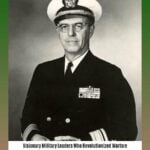Prepare to delve into the annals of history as we explore the riveting tales of iconic military leaders and their landmark battles in “Iconic Military Leaders and Their Landmark Battles Reshaping the Course of History.” Join us as we unravel the strategies, leadership styles, and technological advancements that have shaped the fate of civilizations throughout the ages. From Alexander the Great’s brilliant tactics to Napoleon Bonaparte’s audacious campaigns, we’ll illuminate the enduring impact these legendary figures have left on the art of warfare and the course of human history.
Key Takeaways:
![]()
- Military leaders have been pivotal in shaping history across time.
- Great leaders exhibit remarkable strategic thinking, tactical prowess, and inspirational abilities.
- Alexander the Great, Julius Caesar, and Napoleon Bonaparte are notable examples of military brilliance.
- Chinese General Sun Tzu emphasized strategic deception in his treatise “The Art of War.”
- Admiral Horatio Nelson’s naval strategies revolutionized sea warfare.
- George Washington’s leadership and perseverance propelled the Continental Army to victory.
- Genghis Khan’s military dominance and political savvy created an unprecedented empire.
- Joan of Arc’s courage, charisma, and leadership inspired the French army amidst war.
- Military campaigns and conquests have profoundly influenced military theory and practice.
Iconic Military Leaders and Their Landmark Battles
Throughout history, wars have been waged, and battles have been fought to alter the course of humanity’s journey. Amidst the chaos, iconic military leaders have emerged, their strategies and triumphs leaving an indelible mark on the annals of time. Join us as we delve into the extraordinary stories of these legendary figures and the landmark battles that propelled them to greatness.
Alexander the Great: Battle of Gaugamela
At the tender age of 25, Alexander the Great’s audacious tactics shattered the mighty Persian Empire at Gaugamela. His innovative wedge formation, coupled with his astute leadership, proved invincible, securing him the largest empire the ancient world had ever witnessed.
Julius Caesar: Battle of Alesia
Caesar, Rome’s military mastermind, showcased his brilliance at Alesia. Faced with overwhelming odds, he devised a daring siege and fortification strategy that outmaneuvered the Gallic tribes, extending Roman dominance over vast territories.
Hannibal: Battle of Cannae
Hannibal, Carthage’s greatest general, stunned the Romans at Cannae. His ingenious use of cavalry encircled the Roman legions, inflicting a devastating defeat that forever etched his name in military history.
Napoleon Bonaparte: Battle of Waterloo
Napoleon’s lightning-fast campaigns and charismatic leadership propelled him to conquer much of Europe. However, his hubris led to his downfall at Waterloo, where Wellington’s superior strategy and the timely arrival of the Prussians sealed his fate.
Erwin Rommel: Battle of El Alamein
Known as the “Desert Fox,” Rommel’s daring tactics and uncanny ability to adapt to the unforgiving North African terrain made him a formidable opponent. His victory at El Alamein was a testament to his military acumen, even in the face of overwhelming odds.
These legendary military leaders epitomized courage, brilliance, and unwavering determination. Their landmark battles reshaped geopolitical landscapes, influenced military strategy for centuries to come, and continue to inspire generations of aspiring commanders. Their legacies serve as a reminder of the profound impact individuals can have on the course of history.
Dive into the extraordinary world of legendary military commanders and their battles, where you’ll unravel tales of epic confrontations and strategic brilliance. From Alexander the Great’s relentless conquests to Napoleon Bonaparte’s masterful campaigns, explore the minds of military geniuses and the conflicts that shaped history.
Discover the famous commanders’ greatest military campaigns, where valor and leadership collide. Witness Hannibal’s audacious crossing of the Alps, Caesar’s decisive victory at Alesia, and Patton’s relentless pursuit across Europe. These campaigns showcase the ingenuity, determination, and strategic thinking that have defined military history.
Delve into the renowned commanders and their seminal conflicts, where legendary warriors and their defining battles left an indelible mark on the course of human civilization. From Genghis Khan’s sweeping Mongol conquests to Wellington’s triumph at Waterloo, these battles forged empires, changed borders, and forever altered the geopolitical landscape.
Strategies and Tactics: The Cornerstones of Military Triumphs
Throughout history, legendary military leaders have emerged, leaving an indelible mark on the annals of warfare through their ingenious strategies and tactics. Join us as we delve into the brilliance of these commanders and the pivotal battles that enshrined their names in history.
Alexander the Great and the Battle of Gaugamela
Alexander the Great, renowned for his audacious tactics, faced the mighty Persian Empire at Gaugamela. Employing a deceptive wedge formation, he masterfully divided the enemy’s forces, allowing his cavalry to exploit gaps and inflict a crushing defeat.
Julius Caesar and the Battle of Alesia
Caesar’s military prowess was evident at Alesia. Facing a massive Gallic army, he outmaneuvered them with a daring double siege. By erecting fortifications around the enemy and his own camp, Caesar effectively isolated the Gauls, forcing them into submission.
Hannibal and the Battle of Cannae
Hannibal’s tactical genius was showcased at Cannae. Outnumbered, he lured the Roman legions into an encirclement using his innovative cavalry. The Romans, trapped and surrounded, suffered one of their worst defeats in history.
Napoleon Bonaparte and the Battle of Waterloo
Napoleon’s military brilliance was matched by his hubris. At Waterloo, his impetuous attack against a well-fortified British army proved disastrous. Wellington’s superior strategy and the timely Prussian intervention shattered Napoleon’s dream of European domination.
Erwin Rommel and the Battle of El Alamein
Rommel, the “Desert Fox,” exhibited his tactical acumen in North Africa. Adapting to the unforgiving terrain, he employed mobile warfare and lightning-fast maneuvers to outwit the Allied forces.
Key Takeaways:
- Strategic thinking and long-term planning are vital for military success.
- Innovative tactics and adaptability allow commanders to overcome numerical and logistical challenges.
- Excellent command and control of troops enable commanders to execute strategies effectively.
- Anticipating and exploiting enemy weaknesses is crucial for victory.
- Mastery of terrain and logistics provides a significant advantage in warfare.
Most Relevant URL Source:
- War Insights: Hannibal’s Strategic Brilliance
Leadership Qualities of Iconic Military Leaders
They’ve influenced the course of civilization. They’ve left an imprint on history. They’re iconic military leaders who’ve reshaped the world with their strategies, victories, and leadership qualities.
We’re delving into the campaigns of these legendary figures, dissecting their leadership qualities, and exploring how they orchestrated their iconic triumphs. Join us as we unveil the secrets of their military prowess.
Alexander the Great and the Battle of Gaugamela: With a vision as sharp as his sword, Alexander the Great conquered the Persian Empire. His education honed his strategic thinking, enabling him to devise innovative formations that overwhelmed his foes.
Julius Caesar and the Battle of Alesia: Caesar’s adaptability and resilience shone at the Battle of Alesia. He outsmarted the Gallic tribes by devising a daring siege strategy that showcased his command over his legions.
Hannibal and the Battle of Cannae: Hannibal’s mastery of terrain and tactics allowed him to encircle and annihilate the Roman legions. His audacious use of cavalry and strategic brilliance made him a formidable opponent.
Napoleon Bonaparte and the Battle of Waterloo: Napoleon’s ambition and military genius propelled him to victory after victory. However, his downfall at Waterloo highlights the importance of strategic planning and adapting to changing circumstances.
Erwin Rommel and the Battle of El Alamein: The “Desert Fox” showcased his military acumen and adaptability in the harsh North African terrain. Rommel’s strategic retreats and daring counterattacks earned him respect from both allies and enemies.
Key Takeaways:
- Strategic Thinking: These leaders possessed an exceptional ability to anticipate enemy moves and devise winning strategies.
- Adaptability: They could adjust their tactics to changing circumstances, exploiting opportunities and overcoming obstacles.
- Command and Control: They inspired loyalty and discipline in their troops, ensuring effective execution of their plans.
- Exploiting Enemy Weaknesses: They studied their opponents, identifying their vulnerabilities and exploiting them to gain an advantage.
- Logistics and Terrain: They understood the importance of supplies, troop movements, and terrain to achieve victory.
Most Relevant URL Source:
- War Insights: Hannibal’s Strategic Brilliance
Impact on history:
Alexander the Great and the Battle of Gaugamela:
The Battle of Gaugamela was a decisive victory for Alexander the Great over the Persian Empire. Alexander’s innovative tactics, including the use of a wedge formation, allowed him to defeat the numerically superior Persian army. This victory marked the beginning of Alexander’s conquest of the Persian Empire and had a profound impact on history by spreading Greek culture and influence throughout the Middle East.
Julius Caesar and the Battle of Alesia:
The Battle of Alesia was a decisive victory for Julius Caesar over the Gallic tribes. Caesar’s brilliant strategy and use of siege warfare allowed him to defeat the Gallic leader Vercingetorix and establish Roman control over Gaul. This victory had a significant impact on history by securing Caesar’s power in Rome and allowing him to launch his campaigns against Pompey and Cleopatra.
Hannibal and the Battle of Cannae:
The Battle of Cannae was a devastating defeat for the Roman Republic by the Carthaginian general Hannibal. Hannibal’s brilliant tactics, including the use of a double envelopment, allowed him to annihilate the Roman army. This victory had a profound impact on history by demonstrating the superiority of Carthaginian military tactics and leading to the Second Punic War.
Napoleon Bonaparte and the Battle of Waterloo:
The Battle of Waterloo was a decisive defeat for Napoleon Bonaparte by the Allied forces led by the Duke of Wellington. Napoleon’s overconfidence and poor tactics led to his downfall. This victory had a significant impact on history by ending the Napoleonic Wars and restoring the balance of power in Europe.
Erwin Rommel and the Battle of El Alamein:
The Battle of El Alamein was a decisive victory for the Allied forces over the Axis forces led by Erwin Rommel. Montgomery’s cautious and methodical approach, combined with Rommel’s overextension, led to the defeat of the Axis forces. This victory had a significant impact on history by turning the tide of the war in North Africa and paving the way for the Allied invasion of Italy.
Key Takeaways:
- Military leaders have a profound impact on history through their strategic brilliance, innovative tactics, and charismatic leadership.
- Battles can be decisive turning points in history, shaping the course of nations and empires.
- The lessons learned from military history can be applied to modern warfare and leadership challenges.
Most Relevant URL Source:
- Famous Military Leaders Throughout History: Their Impact and Legacy
![]()
FAQ
Q1: Who is considered one of the greatest military leaders of all time?
A1: Alexander the Great, known for his strategic brilliance and innovative tactics, is widely regarded as one of history’s most remarkable military leaders.
Q2: Which military leader is credited with developing the concept of Total War?
A2: Napoleon Bonaparte, the French emperor, is recognized for pioneering the concept of Total War, which involved mobilizing entire populations and resources for warfare.
Q3: Who was the military genius behind the Mongol Empire’s success?
A3: Genghis Khan, the founder of the Mongol Empire, is renowned for his innovative military strategies and his ability to unite nomadic tribes into a formidable fighting force.
Q4: Which ancient military strategist wrote the influential treatise “The Art of War”?
A4: Sun Tzu, a Chinese general and philosopher, is the author of “The Art of War,” a treatise that has had a profound impact on military thinking for centuries.
Q5: Who led the American Continental Army to victory in the Revolutionary War?
A5: George Washington, the first President of the United States, is celebrated as the military leader who guided the American colonies to independence from British rule.
- SYBAU See You Baby Meaning: Gen Z Slang Evolves - July 1, 2025
- Unlock Your Inner Youth: Lifestyle Secrets for a Vibrant Life - July 1, 2025
- Decode SYBAU Meaning: Gen Z Slang Explained - July 1, 2025





